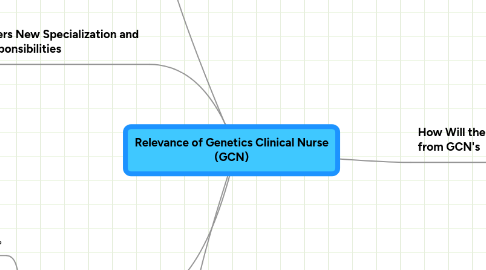
1. Accreditation Process is Developed
1.1. To qualify, genetics clinical nurses need to first become registered nurses, by obtaining a Bachelor’s of Science Degree in Nursing (BSN). It is then a requirement to work for five years in a clinical genetic setting. Genetics Nurses must then pass a rigorous examination and submit written case studies of their experiences to become certified.
1.2. 2001 ISONG approved formation the Genetic Nursing Credentialing Commission (GNCC)
1.3. 2001 Credentialing of the first Genetics Advanced Practice Nurses APNG
1.4. 2002 GCN credential is first offered by GNCC
1.5. http://www.ispub.com/ostia/index.php?xmlFilePath=journals/ijanp/vol5n2/genetics.xml
2. Offers New Specialization and Responsibilities
2.1. Where can GCN's work?
2.1.1. specialty clinics where gene-based diagnoses and therapies are offered
2.1.2. prenatal and reproductive technology centers
2.1.3. cancer centers
2.1.4. primary health care settings
2.1.5. pediatrics clinics
2.1.6. industrial health
2.1.7. school health
2.1.8. research centers
2.1.9. biotech and insurance industrices
2.1.10. www.isong.org/resources/what_is.pdf
2.2. New Role for Nurses
2.2.1. ability to reach and help many more patients
3. Continues Genetic Education
3.1. Future Implications of Genetics Testing
3.1.1. new classification of disease
3.1.2. earlier disease detection
3.1.3. increased opportunities for disease prevention
3.1.4. development of better targeted, more effective and new treatments
3.1.5. http://www.nursevillage.com/nv/content/careeroptions/genetics_nursing.jsp
4. What is a GCN?
4.1. What Do GCN's Do?
4.1.1. take detailed family histories
4.1.2. assess hereditary and nonhereditary risk factors related to genetic diseases,
4.1.3. construct pedigrees
4.1.4. provide genetic information to individuals and families
4.1.5. interpret genetic tests and laboratory data
4.1.6. manage and care for patients and families at risk for or affected by genetic diseases or diseases with a genetic component
4.1.7. http://findarticles.com/p/articles/mi_m0FSS/is_2_12/ai_n18615558/
4.2. Definition of a Genetics Clinical Nurse
4.2.1. a registered nurse with special education and training in genetics who cares for individuals, families, and communities at risk for or affected by genetic diseases, or diseases or conditions with a genetic component
4.2.2. http://findarticles.com/p/articles/mi_m0FSS/is_2_12/ai_n18615558/
5. How Will the Public Benefit from GCN's
5.1. Who could benefit from genetic nursing?
5.1.1. individuals and families with known hereditary conditions or diseases thought to have a hereditary component
5.1.2. anyone who is considering genetic testing
5.1.3. individuals and couples who are concerned with issues related to pregnancy
5.1.4. couples who have had multiple miscarriages
5.1.5. couples who are related, ie. first cousins
5.1.6. healthcare providers who seek genetics consultations for their patients
5.1.7. www.isong.org/resources/what_is.pdf
5.2. How will I benefit from genetic nursing?
5.2.1. potential future specialization
5.2.2. personal issues with pregnancy
5.2.3. future genetic counseling
